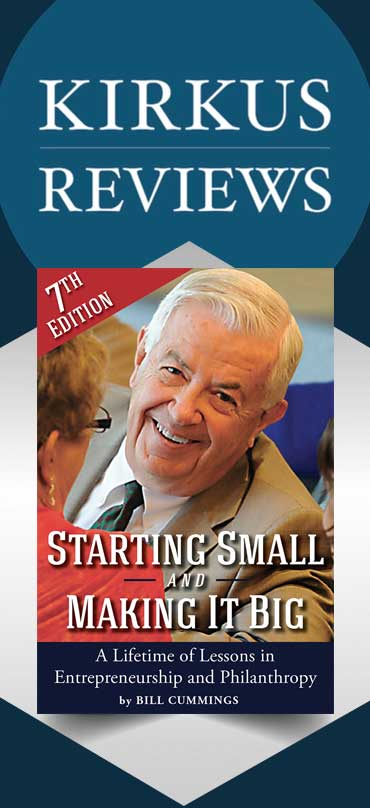
Sound, ethical business advice that young entrepreneurs may find useful in advancing in their own careers and lives.

For nearly 100 years, Kirkus Reviews has stood for integrity, honesty, and accessibility. The New York-based firm reviews more than 10,000 books each year, offering potential readers a summary and an unbiased opinion. Read its review of Starting Small and Making It Big below or on the Kirkus Review website.
In Cummings’ autobiography, he intertwines business insights and lessons learned, highlighting how small beginnings, persistence, and ethical leadership can help a company thrive.
Cummings begins by reflecting on his upbringing during the Great Depression, emphasizing how his parents’ frugality and resourcefulness shaped his work ethic. He was a young entrepreneur, selling ice cream and used small motorboats, which helped him develop practical business skills. The book outlines Cummings’ business ventures, particularly the founding and growth of Cummings Properties, which specializes in commercial real estate and has a portfolio of 11 million square feet in the Boston metro area. His strategic approach emphasizes long-term relationships, high occupancy rates, and community integration, rather than focusing solely on maximizing profits.
Through thoughtful mentorship (including that of Gorton’s of Gloucester’s late chairman E. Robert Kinney) and leadership development, Cummings ensured the success and sustainability of his own companies. The entrepreneur gradually shifted his goals from accumulating wealth to giving back. He and his wife, Joyce, founded the Cummings Foundation, donating significant portions of their real estate portfolio to support local nonprofits, like Pine Street Inn, a major Boston homeless shelter. The book details their involvement in the Giving Pledge, an organization whose members submit a written pledge to donate at least half of their assets to charitable causes, and their efforts to democratize philanthropy by involving volunteers in the grant-making process.
Throughout his book, Cummings considers the importance of leadership continuity, sharing anecdotes about mentoring young leaders and overcoming setbacks. The unexpected loss of a key colleague taught him about the need for succession planning, which became a priority for both his business and philanthropic endeavors. The author emphasizes the joy found in philanthropy; for example, he turned foundation events into celebrations that uplifted and recognized nonprofit workers. His business philosophy involves ethical workplace practices, mentorship, personal responsibility, community engagement, and thoughtful decision-making. Cummings’ story serves as both a memoir and a guidebook, demonstrating how small ventures can grow into sizable enterprises, and his journey underscores the idea that success isn’t just about wealth accumulation, but also involves using resources to make a lasting positive impact on others.
Overall, Cummings lucidly recounts his accomplishments in business ventures and his commitment to facing challenges directly rather than “leaving problems to fester.” However, readers may be disappointed that there is limited exploration of the structural factors (such as systemic racism, gender bias, or economic disparity) that may stymie others from following a similar path. Nonetheless, the experiences shared contain universal lessons that will apply to professionals no matter what stage they are in their career (“It helps to show people that you are on their side before trying to get them on yours”). Finally, the author uses a great deal of warmth when describing the people who supported him through the years, reinforcing a recurring theme throughout Cummings’ stories—appreciate the person rather than their position.
Sound, ethical business advice that young entrepreneurs may find useful in advancing in their own careers and lives.